Podcast: Play in new window | Download (Duration: 11:22 — 7.9MB) | Embed
Subscribe: Apple Podcasts | Spotify | Amazon Music | Android | Pandora | iHeartRadio | JioSaavn | Podchaser | Gaana | Podcast Index | Email | TuneIn | Deezer | Anghami | RSS | More
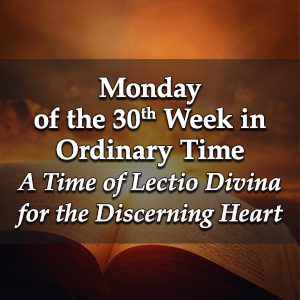 Monday of the Thirtieth Week in Ordinary Time – A Time of Lectio Divina for the Discerning Heart Podcast
Monday of the Thirtieth Week in Ordinary Time – A Time of Lectio Divina for the Discerning Heart Podcast
As you begin, take a deep breath and exhale slowly. For at least the next few moments, surrender all the cares and concerns of this day to the Lord.
Say slowly from your heart “Jesus, I Trust In You…You Take Over”
Become aware that He is with you, looking upon you with love, wanting to be heard deep within in your heart…
From the Holy Gospel According to St. Luke 13:10-17
One sabbath day Jesus was teaching in one of the synagogues, and a woman was there who for eighteen years had been possessed by a spirit that left her enfeebled; she was bent double and quite unable to stand upright. When Jesus saw her he called her over and said, ‘Woman, you are rid of your infirmity’ and he laid his hands on her. And at once she straightened up, and she glorified God.
But the synagogue official was indignant because Jesus had healed on the sabbath, and he addressed the people present. ‘There are six days’ he said ‘when work is to be done. Come and be healed on one of those days and not on the sabbath.’ But the Lord answered him. ‘Hypocrites!’ he said ‘Is there one of you who does not untie his ox or his donkey from the manger on the sabbath and take it out for watering? And this woman, a daughter of Abraham whom Satan has held bound these eighteen years – was it not right to untie her bonds on the sabbath day?’ When he said this, all his adversaries were covered with confusion, and all the people were overjoyed at all the wonders he worked.
What word made this passage come alive for you?
What did you sense the Lord saying to you?
Once more give the Lord an opportunity to speak to you:
One sabbath day Jesus was teaching in one of the synagogues, and a woman was there who for eighteen years had been possessed by a spirit that left her enfeebled; she was bent double and quite unable to stand upright. When Jesus saw her he called her over and said, ‘Woman, you are rid of your infirmity’ and he laid his hands on her. And at once she straightened up, and she glorified God.
But the synagogue official was indignant because Jesus had healed on the sabbath, and he addressed the people present. ‘There are six days’ he said ‘when work is to be done. Come and be healed on one of those days and not on the sabbath.’ But the Lord answered him. ‘Hypocrites!’ he said ‘Is there one of you who does not untie his ox or his donkey from the manger on the sabbath and take it out for watering? And this woman, a daughter of Abraham whom Satan has held bound these eighteen years – was it not right to untie her bonds on the sabbath day?’ When he said this, all his adversaries were covered with confusion, and all the people were overjoyed at all the wonders he worked.
What did your heart feel as you listened?
What did you sense the Lord saying to you?
Once more, through Him, with Him and in Him listen to the Word:
One sabbath day Jesus was teaching in one of the synagogues, and a woman was there who for eighteen years had been possessed by a spirit that left her enfeebled; she was bent double and quite unable to stand upright. When Jesus saw her he called her over and said, ‘Woman, you are rid of your infirmity’ and he laid his hands on her. And at once she straightened up, and she glorified God.
But the synagogue official was indignant because Jesus had healed on the sabbath, and he addressed the people present. ‘There are six days’ he said ‘when work is to be done. Come and be healed on one of those days and not on the sabbath.’ But the Lord answered him. ‘Hypocrites!’ he said ‘Is there one of you who does not untie his ox or his donkey from the manger on the sabbath and take it out for watering? And this woman, a daughter of Abraham whom Satan has held bound these eighteen years – was it not right to untie her bonds on the sabbath day?’ When he said this, all his adversaries were covered with confusion, and all the people were overjoyed at all the wonders he worked.
What touched your heart in this time of prayer?
What did your heart feel as you prayed?
What do you hope to carry with you from this time with the Lord?
Our Father, who art in heaven,
hallowed be thy name.
Thy kingdom come.
Thy will be done on earth, as it is in heaven.
Give us this day our daily bread,
and forgive us our trespasses,
as we forgive those who trespass against us,
and lead us not into temptation,
but deliver us from evil.
Amen


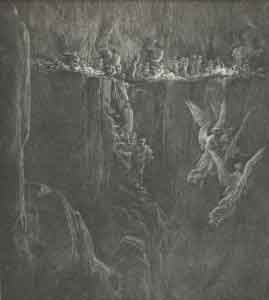
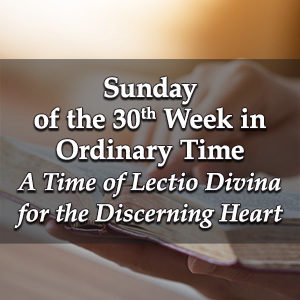 Sunday of the Thirtieth Week in Ordinary Time – A Time of Lectio Divina for the Discerning Heart Podcast
Sunday of the Thirtieth Week in Ordinary Time – A Time of Lectio Divina for the Discerning Heart Podcast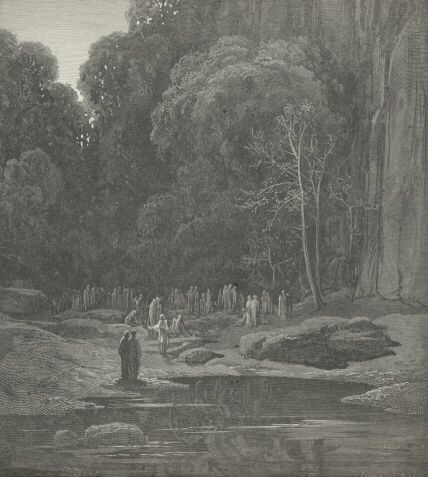
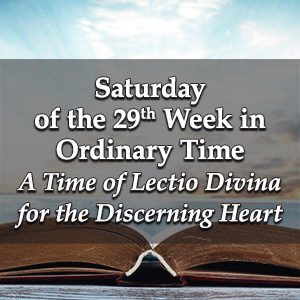 Saturday of the Twenty-Ninth Week in Ordinary Time – A Time of Lectio Divina for the Discerning Heart Podcast
Saturday of the Twenty-Ninth Week in Ordinary Time – A Time of Lectio Divina for the Discerning Heart Podcast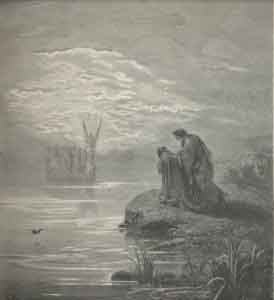
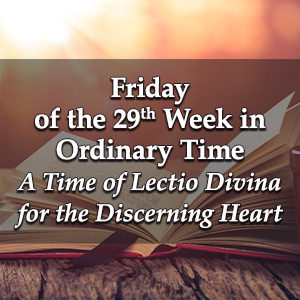 Friday of the Twenty-Ninth Week in Ordinary Time – A Time of Lectio Divina for the Discerning Heart Podcast
Friday of the Twenty-Ninth Week in Ordinary Time – A Time of Lectio Divina for the Discerning Heart Podcast
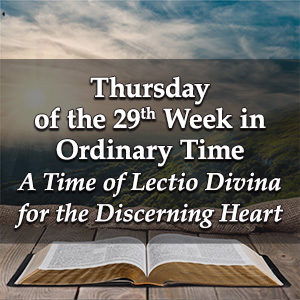 Thursday of the Twenty-Ninth Week in Ordinary Time – A Time of Lectio Divina for the Discerning Heart Podcast
Thursday of the Twenty-Ninth Week in Ordinary Time – A Time of Lectio Divina for the Discerning Heart Podcast